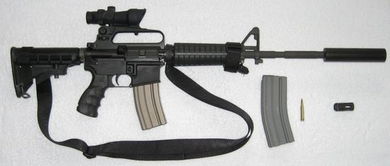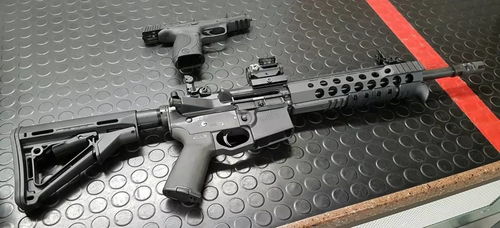Understanding AR-15 Scopes: A Comprehensive Guide
When it comes to enhancing the accuracy and versatility of your AR-15 rifle, scopes play a crucial role. Whether you’re a recreational shooter, a competitive shooter, or a law enforcement officer, choosing the right scope can make a significant difference in your performance. In this detailed guide, we’ll delve into the various aspects of AR-15 scopes, helping you make an informed decision.
Types of AR-15 Scopes

There are several types of scopes available for AR-15 rifles, each with its unique features and benefits. Let’s take a closer look at some of the most popular ones:
| Type | Description | Best Suited For |
|---|---|---|
| Red Dot Scope | Compact and lightweight, offering a quick鐬勫噯鐐?/td> | Recreational shooting, close-range combat |
| Variable Power Scope | Adjustable magnification for various distances | Long-range shooting, hunting |
| Fixed Power Scope | Single magnification setting for specific distances | Target shooting, hunting |
| Optical Scope | High-quality glass and optics for clear vision | Competitive shooting, hunting |
Red dot scopes are perfect for close-range shooting, as they provide a quick and easy鐬勫噯鐐?without the need for magnification. Variable power scopes offer the flexibility to adjust the magnification for various distances, making them ideal for long-range shooting and hunting. Fixed power scopes are suitable for specific distances, such as target shooting or hunting, where a consistent magnification is preferred. Optical scopes, on the other hand, provide high-quality glass and optics for clear vision, making them ideal for competitive shooting and hunting.
Key Features to Consider

When selecting an AR-15 scope, there are several key features to consider to ensure you get the best performance:
- Objective Lens Size: The objective lens size determines the amount of light that enters the scope. Larger objective lenses provide better visibility in low-light conditions.
- Field of View: The field of view is the width of the area visible through the scope at a specific distance. A wider field of view allows for a broader view of the target area.
- Eye Relief: Eye relief is the distance between the shooter’s eye and the scope’s lens. A sufficient eye relief ensures comfort and reduces the risk of eye injury.
- Adjustment Turrets: Adjustment turrets allow you to adjust the scope’s windage and elevation to compensate for bullet drift and target movement.
- Parallax Adjustment: Parallax adjustment helps minimize the effect of parallax, which is the difference in the apparent position of the target at different distances from the shooter’s eye.
- Material: The material of the scope’s construction affects its durability and weight. High-quality materials like aircraft-grade aluminum and stainless steel are preferred.
When choosing an AR-15 scope, consider the specific needs of your shooting activities. For example, if you’re hunting in low-light conditions, a scope with a large objective lens and good light transmission is essential. If you’re engaging in competitive shooting, a scope with quick target acquisition and minimal parallax is ideal.
Top AR-15 Scopes

Here are some of the top AR-15 scopes available on the market, based on their performance, features, and user reviews:
- Leupold Mark 4 LR/T 6.5-20x50mm: Known for its exceptional build quality and accuracy, this scope is a favorite among long-range shooters and hunters.
- Smith & Wesson M&P 15-22 4-12x40mm: This scope offers a wide range of magnification and a clear, bright image, making it suitable for various shooting applications.
- Primary Arms 6-24x50mm: This scope is highly
